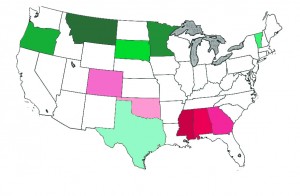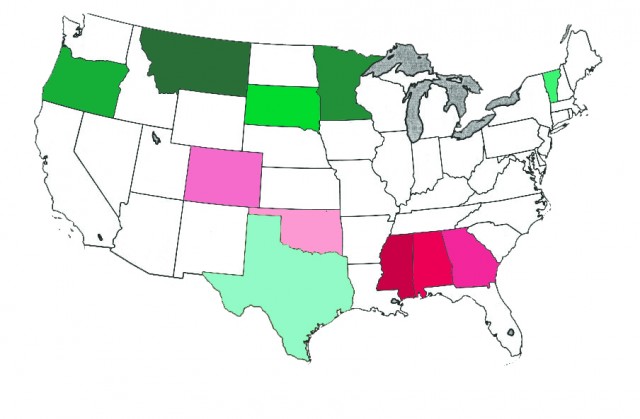
By Abigail Loop
Staff Writer
One Baylor professor examined political inequality in the contiguous states of America and has offered a possible solution to achieving equal representation for all.
Dr. Patrick Flavin, assistant professor of political science, conducted a study where he gathered data on the U.S. and ranked them from having the best to worst equality in political representation.
He measured equality in states through a number of factors, including data from public opinion surveys and federal data, such as the amounts of welfare benefits and tax rates. After combining the data he received, Flavin concluded the stricter the lobbying regulation, a more equal representation was evident in states.
“I’m interested in how people’s opinions are represented,” Flavin said. “If the goal was to make everyone’s opinions equal then I think having stricter lobbying regulation rules is a solution to unequal representation.”
Flavin said while conducting his study, he noticed the states that already had strict regulations had higher equality than the states with loose regulations where it seemed the priorities of wealthy constituents were at the forefront.
“Wealthy people have better connections and are able to contribute more to campaigns,” he said. “Therefore, more affluent people are better represented in politics.”
Texas fell right in the middle of the ranking, neither below or above average when looking at equal political representation.
With wealthy citizens affecting lobbyists, these lobbyists can affect elected officials in the government as well, bringing the opinions of the wealthy to a national level, Flavin said.
“Lobbyists already have outside influence and in elections they can influence the policies of the elected officials,” he said. “We need to increase the equality of who gets listened to, regardless of political parties.”
Dr. David Bridge, assistant professor of political science, said Flavin’s research adds insight into democracy regarding representation.
“Representation is difficult to observe, to see who is and who isn’t represented,” Bridge said. “The ultimate currency in an election is votes, no matter how poor or wealthy you are.”
Bridge said that in American politics, money matters and it can be difficult to balance speech, especially during election season.
According to Flavin’s study, harmony between citizen’s opinions and public policy output is the “bottom line” for American democracy and there is a considerable variation in the equality of political representation across the states.
Flavin said with his findings and data he’s collected from his research, he’s hoping it will make a difference.
“It has real-world promise and implications,” Flavin said. “The takeaway of all of this is gain political equality, limit lobbyists access to legislators and work on equality on a federal level.”



